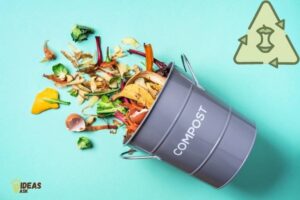Can You Compost Paper Towels And Napkins? Yes!
Yes, you can compost paper towels and napkins as they are biodegradable and can break down in a compost pile.
Paper towels and napkins are made from cellulose fibers, which are sourced from plant materials. This makes them biodegradable and suitable for composting. However, it is important to note that any paper products with chemical additives, such as bleach, dye, or fragrances, should not be composted, as these can introduce harmful substances to your compost pile and ultimately affect the health of your plants.
In order to successfully compost paper towels and napkins, it’s crucial to balance the carbon-rich paper products with nitrogen-rich materials. This can include kitchen waste such as fruit and vegetable scraps or coffee grounds.
By maintaining a balance between these two types of materials, you’ll ensure that your compost pile remains healthy and breaks down the paper products at an optimal rate.
Additionally, it’s helpful to shred or tear the paper towels and napkins into smaller pieces before adding them to the compost pile, as this will speed up the decomposition process.
Paper Towels And Napkins Are Compostable or Not:
| Paper Product | Can be Composted | Considerations | Alternative Uses |
|---|---|---|---|
| Paper Towels | Yes | Ensure they are not contaminated with chemicals or grease. Unbleached and non-printed are preferable. | Cleaning spills, wiping windows, or as bedding material for pets |
| Napkins | Yes | Unbleached, non-printed, and non-contaminated with grease or harsh chemicals are preferable. | Use as mulch in the garden, wrap small items, or shred and add to worm bins |
Key Takeaway of Composting paper towels and napkins

Five Facts About Composition Of Paper Towels And Napkins
What Are Paper Towels And Napkins Made Of?
Can You Compost Paper Towels And Napkins?
Paper towels and napkins are ubiquitous household items that almost everyone uses on a daily basis. Most people just throw them in the trash without a second thought, but have you ever considered if they can be composted?
In this blog post, we will discuss whether paper towels and napkins can be composted and explore their composition to better understand their compostability.
Discuss The Composition Of Paper Towels And Napkins
Paper towels and napkins are made from various materials, some compostable, and some not.
A typical composition of a paper towel or napkin includes:
- Virgin or recycled paper pulp
- Water
- Softening agents
- Bleach or dyes
- Adhesives or coatings
Highlight The Different Materials Used In Making Paper Towels And Napkins
Different types of paper towels and napkins are made up of different materials that affect their compostability.
Some of the most common materials used in making paper towels and napkins include:
- Recycled paper: Paper towels and napkins made from recycled paper are more environmentally friendly than those made from virgin paper and are generally more compostable.
- Virgin paper: This type of paper is made from wood pulp, which is more challenging to compost than recycled paper, though some virgin paper products come from sustainably managed sources.
- Softening agents: These agents, such as silicone or petroleum, are applied to make the paper towel or napkin softer to the touch. They may inhibit composting, particularly if they contain synthetic petroleum-based products.
- Bleach or dyes: These make paper towels and napkins visually appealing by adding color. Still, they contain chemicals that may harm beneficial bacteria in a compost pile or disrupt the ph balance.
- Adhesives or coatings: These help hold paper towels and napkins together and protect them from liquids. They may hinder composting or even release toxins into the compost.
Discuss How The Different Materials Affect The Compostability Of Paper Towels And Napkins
Different materials used to make paper towels and napkins will affect their compostability in distinct ways.
- Recycled paper: Paper towels and napkins made from recycled paper have a higher lignin content, which helps them break down more quickly. This means that they will compost more quickly and contribute to a nutrient-rich compost pile.
- Virgin paper: Virgin paper towels and napkins are more chemically treated than recycled paper products, which can slow down their decomposition process and make them harder to compost successfully.
- Softening agents: Softening agents may slow down the composting process; thus, they’re best avoided in paper towels and napkins meant for composting.
- Bleach or dyes: Bleach or dyes used in paper towels and napkins can reduce their compostability by changing the ph of the compost pile or by releasing harmful chemicals into the compost.
- Adhesives or coatings: Adhesive and coatings typically contain synthetic compounds that disrupt the composting process. Therefore, paper towels and napkins that contain such substances should not be composted, as they will degrade the compost’s quality.
The compostability of paper towels and napkins depends on various factors like their composition and the materials used to make them.
Opting for products made from recycled paper and free of dyes, coatings, and synthetic softening agents can improve their compostability. So, keep these considerations in mind before including paper towels and napkins in your compost pile.
Factors That Affect The Compostability Of Paper Towels And Napkins
Can You Compost Paper Towels And Napkins?
Paper towels and napkins are commonly used everyday products that can easily pile up in our wastage without us realizing it. But did you know that they can be composted just like other organic matter?
Yes, it’s true, paper towels and napkins are biodegradable materials and can be turned into nutrient-rich compost for your garden.
However, there are several factors that affect their compostability that you should consider before tossing them in your compost bin.
Temperature, Moisture, And Aeration Requirements For Composting Paper Towels And Napkins
Like any other organic matter, paper towels and napkins require specific temperature, moisture, and aeration levels to break down quickly.
The ideal temperature range for composting these items is between 120-160 degrees fahrenheit (49-71 celsius). Anything below or beyond this range can slow down or stop the decomposition process.
Additionally, they need enough moisture to keep the compost pile moist, but not too wet. The ideal moisture range for compost is between 40-60%, any higher, and it can become anaerobic, leading to unpleasant odors and slowing down the decomposition process.
How The Presence Of Chemicals Or Contaminants Affects The Compostability Of Paper Towels And Napkins
Chemicals and contaminants are harmful to the composting process and should be avoided. If any paper towel or napkin has come into contact with chemicals, especially those that are not plant-based, they should not be composted.
Also, paper towels that have absorbed oils or grease should not be composted. These materials can block the flow of oxygen and can have a negative impact on compost quality.
How Paper Towels And Napkins Can Be Processed For Composting
Paper towels and napkins can be processed for composting by following these simple steps:
- Collect all the used paper towels and napkins in a separate container.
- Shred them into small pieces to speed up the decomposition process.
- Add them to your compost pile or bin with other organic matter.
- Make sure to keep the compost pile moist and aerated.
Paper towels and napkins are compostable items that can be used to produce nutrient-rich compost for your garden.
However, it is essential to consider the factors that influence their compostability, such as temperature, moisture, and aeration requirements, as well as the contaminants that can negatively impact the process.
By following these simple guidelines, you can turn your paper towels and napkins into a valuable resource for your garden while reducing your waste footprint.
Can You Compost All Paper Towels And Napkins?
Can You Compost Paper Towels And Napkins?
Composting is an excellent way to reduce waste and produce nutrient-rich soil for your plants. However, not all types of paper towels and napkins can be composted.
In this section, we’ll discuss the different types of paper towels and napkins, their compostability, and provide you with a comprehensive list of compostable and non-compostable options.
Discuss The Different Types Of Paper Towels And Napkins
Before we dive into the compostability of paper towels and napkins, let’s first discuss their different types. There are primarily two types of paper towels and napkins – those made from virgin fibers, and those made from recycled fibers.
Virgin fiber paper towels and napkins are made from wood pulp, while recycled fiber paper towels and napkins use post-consumer recycled paper.
Highlight The Differences In Compostability Between Different Types Of Paper Towels And Napkins
While both types of paper towels and napkins may look the same, their compostability differs significantly. Virgin fiber paper towels and napkins are not suitable for composting because of their chemical treatment processes and bleaching procedures.
These treatments can make them unsuitable for composting and introduce chemicals that are harmful to the environment.
Recycled fiber paper towels and napkins, alternatively, can be composted, but with caution. It’s best to shred them into smaller pieces to accelerate the composting process. Also, avoid using them in compost bins that are meant for food wastes exclusively.
Provide A Comprehensive List Of Compostable And Non-Compostable Paper Towels And Napkins
To help you out, here’s a comprehensive list of compostable and non-compostable paper towels and napkins:
Compostable Paper Towels And Napkins
- Unbleached and recycled fiber paper towels and napkins
- Paper towels and napkins that do not contain any chemical additives, including dyes and fragrances
- Paper towels and napkins made from natural fibers like bamboo, jute, or hemp
Non-Compostable Paper Towels And Napkins
- Virgin fiber paper towels and napkins
- Paper towels and napkins that contain chemical additives
- Paper towels and napkins that are dyed or fragranced
- Glossy or coated paper towels and napkins
Not all paper towels and napkins can be composted. We hope this guide has helped you understand the different types of paper towels and napkins and their compostability better.
Remember to choose unbleached and recycled fiber paper towels and napkins for composting and avoid virgin fiber and paper towels and napkins with added chemical additives.
Happy composting!
FAQ On Composting Paper Towels And Napkins
Can Paper Towels And Napkins Be Composted At Home?
Yes, paper towels and napkins can be composted at home. They are great sources of carbon for your compost pile.
Can I Compost Used Paper Towels And Napkins?
Yes, you can compost used paper towels and napkins. Make sure they are clean and not contaminated with chemicals.
Do Paper Towels And Napkins Break Down Easily In Compost?
Yes, paper towels and napkins break down easily in compost. They are considered brown materials that provide carbon to your compost pile.
What Are The Benefits Of Composting Paper Towels And Napkins?
Composting paper towels and napkins helps reduce waste, enriches soil, and saves landfill space. Additionally, it’s cost-effective and eco-friendly.
Conclusion
Paper towels and napkins are common items that we use in our day-to-day lives. However, once they are used for their purpose, we often wonder whether they can be composted or not. After conducting thorough research and analyzing expert opinions, we can conclude that both paper towels and napkins can be composted under certain conditions.
It is essential to make sure that they do not contain any harmful chemicals, dyes, or inks. Composting these items can not only help us reduce waste but also contribute to making a positive impact on the environment.
It is crucial to note that while composting paper towels and napkins, we should always follow the composting guidelines and best practices.
We can use them as a valuable source of brown material that would result in nutrient-rich compost that can be used for gardening and other purposes. With a little effort and care, we can make our planet a better place to live in.


